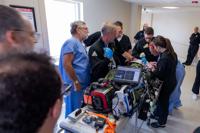PITTSBURGH — On four occasions last year, medical helicopters flew over Pittsburgh transporting not injured humans, but wounded pigs.
The pigs — bleeding heavily from the abdomen — were stabilized in the air by an autonomous medical intervention system developed by the University of Pittsburgh as part of a military-funded study with the potential for “groundbreaking” advances in health care.
The autonomous Resuscitation based on Functional Hemodynamic Monitoring (ReFit) system is shown in the foreground, while emergency clinicians and researchers check the animal. The ReFit system supplies fluids, medication and blood based on its assessment of the animal’s needs, keeping it alive without human intervention.

